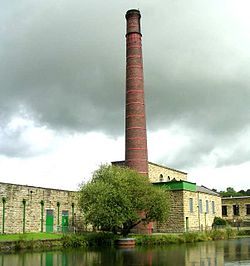 Queen Street Mill | |
| Cotton | |
|---|---|
| Weaving mill | |
| Current status | Closed 12 Mar 1982 |
| Architectural style | Single storey |
| Location | Harle Syke, Burnley, Lancashire, England |
| Owner | Queen Street Manufacturing Company |
| Further ownership |
|
| Current owners | Lancashire Museums |
| Coordinates | 53°49′N 2°12′W / 53.81°N 2.20°W |
| Construction | |
| Built | 1894 |
| Completed | 1895 |
| Floor count | 1 |
| Design team | |
| Awards and prizes and listings | A Grade I listed building.No. 1416482(2013-12-25) |
| Power | |
| Date | 1894 |
| Engine maker | William Roberts of Nelson |
| Engine type | Tandem compound |
| Valve Gear | Corliss valves operated by Dobson trip gear |
| rpm | 68 |
| Installed horse power (ihp) | 500 |
| Transmission type | Direct drive to line shafts |
| Boiler configuration | |
| Boilers | Twin Lancashire boilers, coal fired |
| Pressure | 140 |
| Equipment | |
| Date | 1894 |
| Manufacturer |
|
| No. of looms | 990 (now 308) |
Queen Street Mill is a former weaving mill in Harle Syke, a suburb to the north-east of Burnley, Lancashire, that is a Grade I listed building.[1] It now operates as a museum and cafe. Currently open for public tours between April and November. Over winter the café is opened on Wednesdays. It is also viewable with private bookings.
It was built in 1894 for the Queen Street Manufacturing Company. It closed on 12 March 1982 and was mothballed, but was subsequently taken over by Burnley Borough Council and maintained as a museum. In the 1990s ownership passed to Lancashire Museums. Unique in being the world's only surviving operational steam-driven weaving shed, it received an Engineering Heritage Award in November 2010.
Previously open to visitors and offering weaving demonstrations, the museum closed in September 2016 (except for pre-booked school parties). In April 2018 Lancashire County Council announced that the museum, along with Helmshore Mills Textile Museum and the Judges Lodgings in Lancaster, would reopen three days a week.[2]
- ^ Historic England & 1416482.
- ^ "Cabinet agrees to reopen some Lancashire museums". Lancashire County Council. 13 April 2018. Archived from the original on 27 April 2018. Retrieved 26 April 2018.
